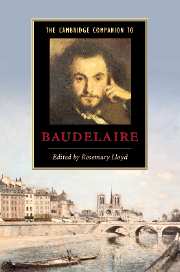Book contents
- Frontmatter
- 1 Charles Baudelaire, a life in writing
- 2 Baudelaire’s politics
- 3 Baudelaire’s poetic journey in Les Fleurs du Mal
- 4 Baudelaire’s versification: conservative or radical?
- 5 The prose poems
- 6 Baudelairean ethics
- 7 Baudelaire’s Paris
- 8 Baudelaire and intoxicants
- 9 Art and its representation
- 10 Music and theatre
- 11 Baudelaire’s literary criticism
- 12 Baudelaire’s place in literary and cultural history
- 13 A woman reading Baudelaire
- 14 Translating Baudelaire
- 15 The stroll and preparation for departure
- Afterword
- Appendix Titles of individual poems and prose poems referred to in the text
- Guide to further reading
- Index
- Index to Baudelaire’s works
- Series list
7 - Baudelaire’s Paris
Published online by Cambridge University Press: 28 August 2006
- Frontmatter
- 1 Charles Baudelaire, a life in writing
- 2 Baudelaire’s politics
- 3 Baudelaire’s poetic journey in Les Fleurs du Mal
- 4 Baudelaire’s versification: conservative or radical?
- 5 The prose poems
- 6 Baudelairean ethics
- 7 Baudelaire’s Paris
- 8 Baudelaire and intoxicants
- 9 Art and its representation
- 10 Music and theatre
- 11 Baudelaire’s literary criticism
- 12 Baudelaire’s place in literary and cultural history
- 13 A woman reading Baudelaire
- 14 Translating Baudelaire
- 15 The stroll and preparation for departure
- Afterword
- Appendix Titles of individual poems and prose poems referred to in the text
- Guide to further reading
- Index
- Index to Baudelaire’s works
- Series list
Summary
Around me the street deafeningly screeched.
La rue assourdissante autour de moi hurlait.
– ‘A une passante’ (translation modified)The development of large cities in the nineteenth century presented a major challenge to poetry which, in the era of Romanticism most particularly, had been severely addicted to nature: nature as context, but often too as object, of lyric emotions. It is Baudelaire, preceded by Poe contemporaneously with Whitman, who 'first' saw that poets needed to find a way of accommodating the making of poetry to the sometimes exhilarating, but mostly prosaic and alienating, mode of existence now led by the inhabitants of cities. Baudelaire saw too that this effort held a crucial clue to the significance of modernity itself. Since 1848, the theological orientation his sensibility then took had led him to define the problem of poetic modernity as a search for the beauty in le mal (whence the title of The Flowers of Evil). But following the 1857 censorship trial of this volume of verse, the question was significantly modified and its orientation shifted, as he began to work on a new edition that in 1861 was to include the section entitled 'Parisian Scenes', and laboured at inventing a new poetic genre, the prose poem.
During these last years of his life, Baudelaire’s attention focused strongly on urban reality, and concomitantly his writing comes to seem less concerned with creating beauty in any conventional sense. Rather it becomes a critical practice, a clinical or diagnostic activity, responding in particular to le mal as the phenomenon of social alienation, understood as the sign of an unhealthy society and most evident in city life. Not that he abandons the problem of beauty and le mal. But the aesthetic theory that is implicit in his poetic texts, which now become increasingly ironic and allegorical, tends to make of the poet, as a denizen of the city, a kind of engaged (better: embattled) social observer, one who is concerned on the one hand to seek out and report on the symptoms that betray the pathological character of the city as a social formation, while somewhat troubled, on the other, by what it might mean for a poet to play such a role.
- Type
- Chapter
- Information
- The Cambridge Companion to Baudelaire , pp. 101 - 116Publisher: Cambridge University PressPrint publication year: 2006
- 2
- Cited by



